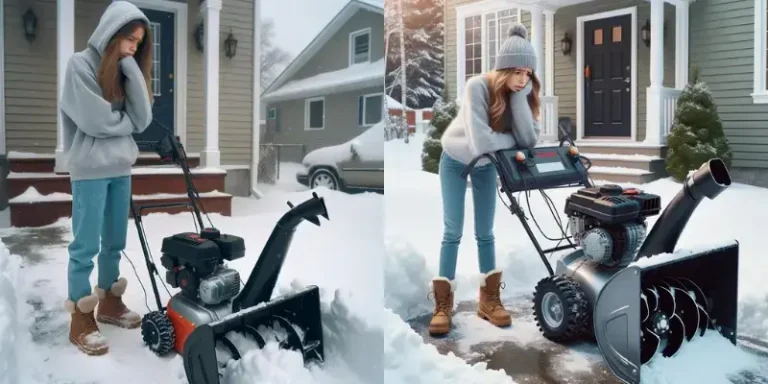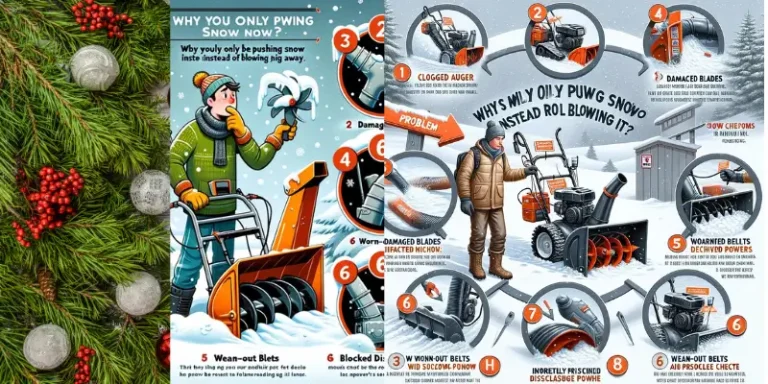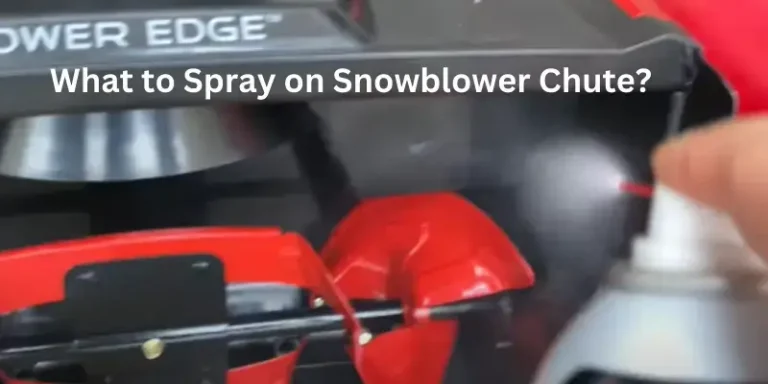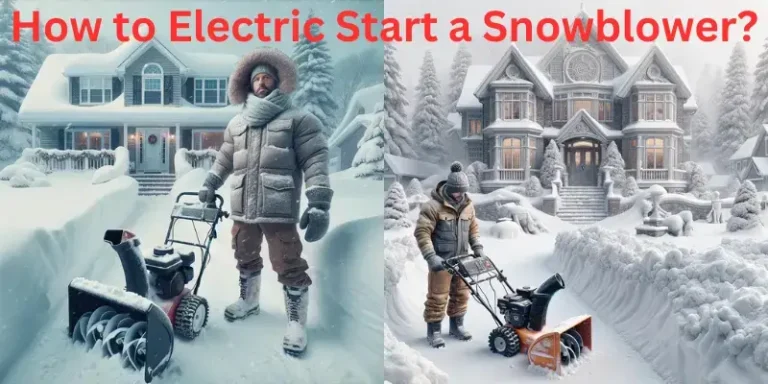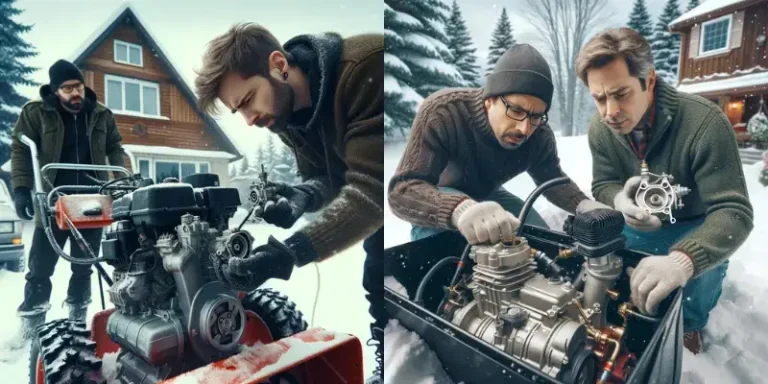Why is my Snowblower Backfiring? 6 Common Reasons and their solutions
Winter can be unforgiving, and your trusty snow blower is your best ally in the battle against heavy snow. There is nothing quite as frustrating as preparing to clear a path through a snowy wonderland with your snowblower, on to be met with unsettling backfires and a question arises into mind “Why is my snowblower backfiring?”
It is very important to identify the root cause of the problem. This way, you can make an informed decision. I am exploring the 6 common reasons why your snowblower is backfiring. Identify the problem and provide you the solution/quick fix so you are able to quickly resolve the issue.
6 Common Reasons Why is My SnowBlower Backfire and their solutions
There are multiple reasons behind the Backfire in Snow Blower. However, I will discuss and provide you an easy solution of 6 Common Reasons of Backfires in Snow Blowers. Lets start:
1. Use of Old or Low Quality Gasoline:
Snowblower is used in winters only so people leave fuel in one season and start the machine with the same fuel in the next winters. This will create a problem in your engine and your snow blower will start backfiring.
Cause: Stale or low-quality gasoline can lead to incomplete combustion in the engine, causing backfires.
Solution: Drain old gasoline and replace it with fresh, high-quality fuel to ensure clean combustion.
2. Spark Plug Degradation:
Spark plug is the most essential component in a combustion engine. It plays an important role in igniting the engine. Due to weather conditions, humidity and other environmental effects, corrosion and rust cover the spark plug and different kinds of problems arise in Snowblower.
Cause: A worn-out or rusted spark plug can misfire, resulting in backfiring.
Solution: Check and replace the spark plug if necessary, ensuring the gap is set correctly.
3. Muffler Construction:
Similarly muffler exhaust flow is also responsible for backfire in snowblower.
Cause: A damaged or improperly functioning muffler can disrupt exhaust flow and cause backfires.
Solution: Inspect the muffler for damage and replace it if necessary to ensure proper exhaust flow.
4. Speed Adjustment Issues in Snowblower:
Another common reason for backfire in snowblower is the speed adjustment. Generally, users give improper throttle while working which causes serious problems and backfire starts in snowblower.
Cause: Running the snowblower at incorrect throttle settings can cause backfiring.
Solution: Follow the manufacturer’s recommendations for throttle settings to prevent backfires.
5. Engine Timing Issues:
Snowblower engine issues are also common reasons behind backfires. It is very obvious that when the engine timing cycle is malfunctioning it automatically generates new problems. One of the problems is the generation of backfires in the snowblower.
Cause: Incorrect engine timing can lead to improper combustion and backfires.
Solution: Consult your snowblower’s manual or a professional to adjust the engine timing correctly.
6. Broken Electric Starter:
Similarly, Broken electric starter is also a serious issue in snowblowers. In general, due to the winter season and water inside the snowblower, electric starter malfunctioning and broken if not replaced on time. It also a reason behind backfire in snowblower.
Cause: A malfunctioning electric starter can disrupt the engine’s starting process, leading to backfiring.
Solution: Repair or replace the electric starter to ensure smooth engine starts.
Understanding Fuel Quality
First off, what do we mean by “fuel quality”? It’s all about the properties of the fuel you’re pouring into your snowblower. High-quality fuel burns cleaner and more efficiently, making your machine run smoother. On the flip side, poor-quality fuel can lead to engine deposits and, yes, backfiring.
Ethanol: Friend or Foe?
Ethanol content in fuel is a hot topic. Ethanol is a type of alcohol added to gasoline to make it burn cleaner, thus reducing pollution. However, it’s not all sunshine and rainbows, especially when it comes to your snowblower. Here’s why:
Ethanol attracts moisture, which can lead to water contamination in your fuel. When water mixes with fuel, it creates an uneven burn, leading to backfiring.
Ethanol can degrade rubber and plastic parts over time, which might affect fuel lines and seals, compromising fuel quality.
Recommendations for Using High-Quality Fuel
So, what can you do to ensure your snowblower is happy, healthy, and backfire-free? Here are some tips:
Go for ethanol-free gasoline: If you can find it, ethanol-free gas is the way to go for your snowblower. It reduces the risk of moisture contamination and protects the engine components.
Use fuel stabilizers: Adding a fuel stabilizer can help protect your fuel from moisture and extend its shelf life. It’s a great way to keep your snowblower running smoothly throughout the winter season.
Store fuel properly: Keep your gasoline in a cool, dry place and use a tight-sealing container. This helps prevent moisture from getting into the fuel.
Regular maintenance: Regularly check your snowblower for any signs of wear and tear, especially in the fuel lines and connections. Replacing these parts before they fail can save you from backfiring issues.
Use fresh fuel: Try to use fresh fuel and avoid storing large quantities for long periods. Gasoline can degrade over time, affecting its combustion properties.
By taking these steps, you’re not just preventing backfiring; you’re also ensuring your snowblower operates at peak efficiency. It’s like giving your snowblower a gourmet meal instead of fast food – it’ll thank you with reliable performance and fewer surprises.
Frequently Asked Questions
Why does old or low-quality gasoline cause my snowblower to backfire?
Old or low-quality gasoline can lead to incomplete combustion in the engine. This causes the fuel to ignite irregularly, resulting in backfires.
How does a spark plug contribute to snowblower backfiring?
A spark plug ignites the engine, but when it’s worn out or rusted, it can misfire. This misfiring can cause the engine to backfire.
Can the muffler affect my snowblower’s performance?
Yes, a damaged or malfunctioning muffler can disrupt exhaust flow, which can lead to backfires in the snowblower.
What throttle settings should I use to prevent my snowblower from backfiring?
Always follow the manufacturer’s recommendations for throttle settings. Improper throttle settings can lead to backfiring.
How does engine timing affect snowblower backfires?
Incorrect engine timing can lead to improper combustion, which can cause the snowblower to backfire.
What is the role of the electric starter in snowblower backfiring?
A malfunctioning electric starter can disrupt the engine’s starting process, leading to backfiring.
What should I do if my snowblower starts backfiring?
First, identify the cause based on the symptoms and then apply the corresponding solution, such as replacing old gasoline, changing the spark plug, or adjusting the engine timing.
Is it necessary to replace the spark plug regularly?
Yes, regularly checking and replacing the spark plug when necessary helps maintain engine efficiency and prevent backfiring.
How often should I replace the gasoline in my snowblower?
It’s best to avoid leaving gasoline in the snowblower between seasons. Always use fresh, high-quality gasoline when starting it for the new season.
Can I fix a backfiring snowblower myself or should I seek professional help?
For simple issues like replacing gasoline or a spark plug, you can do it yourself. However, for more complex issues like engine timing, consulting a professional is advisable.
Conclusion:
Experiencing backfiring in your snowblower can be a frustrating experience, but by identifying the underlying causes and implementing the fixes mentioned above, you can restore your snowblower performance and reliability. It’s essential to maintain your snowblower properly and address issues promptly to ensure a smooth and trouble-free snow-clearing experience.
Don’t let backfiring discourage you from tackling the winter’s heavy snowfall. With the right maintenance and troubleshooting, you can keep your snowblower running smoothly, ensuring that it serves you well in the challenging winter months ahead.
If you have any further questions or require additional information, please feel free to ask.

About Naveed A Hashmi
In my childhood, I used to see my parents while working in the land, for these reasons today I have been serving the same as our own tradition and culture. I thus love to stay in it, because I want to learn something advanced and new so that I may improve my farm’s contour and help others with my experience.


